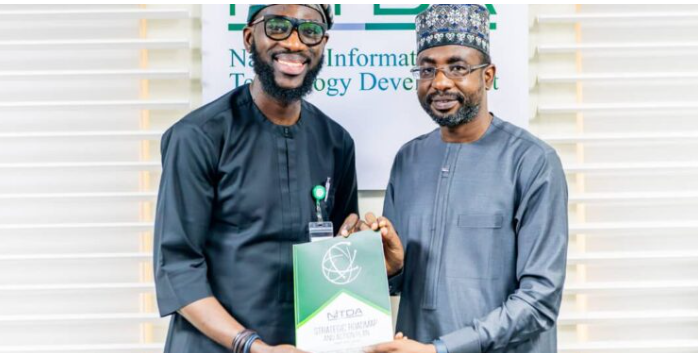In a meeting with Kashifu Inuwa, CCIE, Director General of the National Information Technology Development Agency (NITDA), Google West Africa’s new director, Olumide Balogun, promised to strengthen cooperation between the two organizations. Along with other Google executives, Balogun emphasized the value of the NITDA’s becoming acquainted visit, reiterating Google West Africa’s dedication to the partnership. I’ve been working at Google for four years, and I recently assumed the lead position for the West Africa Director, he claimed. Because Google cannot succeed in isolation, we are gathering here today to determine the crucial steps we must take to jointly actualize the Nigerian President’s initiative to create 1 million digital jobs.
According to Mr. Balogun, Google has been working on the African Internet for more than eight years. He claims, “We announced that Google has shifted from being a mobile-first company to an AI-first company in 2015, during our premier developer event. As a result, we found all the GPT chat conversations to be quite amusing.
A report on artificial intelligence’s effects in Africa is being prepared by Google and will be unveiled in September at the University of Johannesburg. Kashifu Inuwa, Director General of NITDA, has been invited by the director to give a keynote speech. If they work together to develop a plan, Inuwa thinks they can generate a million digital jobs.
Inuwa claims that NITDA is putting Nigeria in a position to quickly create jobs in the digital economy. “We are looking at the Nigeria Startup Act, which identifies some initiatives like talent development that can support job creation,” the speaker says. Nigeria is in an excellent position to close the gap because of its youthful population, according to him. He stated that the role of the government in the ecosystem is to step in when necessary with policies, regulations, and infrastructure. Any regulation should aim to facilitate the development of markets, democratize access to services, safeguard consumers, improve the delivery of services, and foster creativity.
“In general, regulation can be either rule-based or not. We pushed for non-rule-based change. We can ensure that new entrances adhere to the standard by putting it in place and allowing ecosystem players to self-regulate themselves because our goal is to have moral and responsible platforms everywhere”, he said.
Inuwa claimed that NITDA is altering the way that people view government rules and regulations by encouraging ecosystem co-creation throughout all of its endeavors. With a young population, Nigeria could close the digital transformation gap and contribute more than 50% of the global GDP in 2018. According to projections, generative AI will add $7 trillion US dollars, and businesses that have adopted digital transformation contributed 18.5% in 2018.
Although Inuwa acknowledged that the NITDA and Google Developers Group partnership had helped train 150,000 young people in Nigeria, she added, “At the moment, we have an initiative running here in Abuja at our National Centre for Artificial Intelligence and Robotics (NCAIR), and we want to expand the same program to other states through a partnership with the GDG as well. To promote smart manufacturing, we are examining how we can create technology development zones in collaboration with universities.
To attract investment, the speaker is looking into creating a seed investment fund for startups. He claims that even though over $626 billion was invested last year, only 3.5% of that money went to Africa. With the assistance of stakeholders like the speaker, in his opinion, more can be accomplished.
For more news, click HERE.



